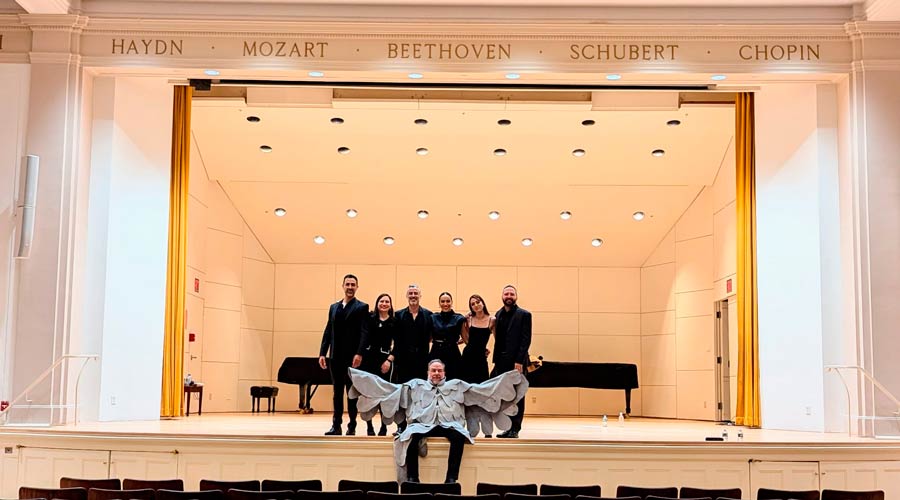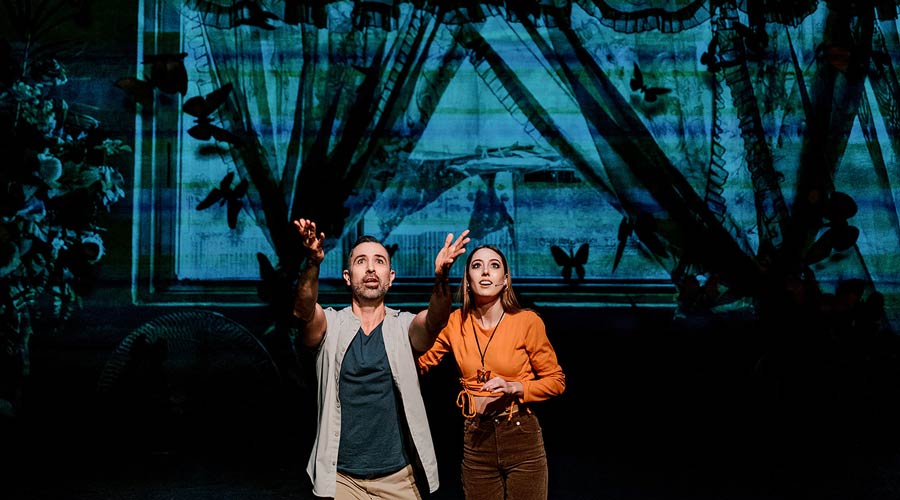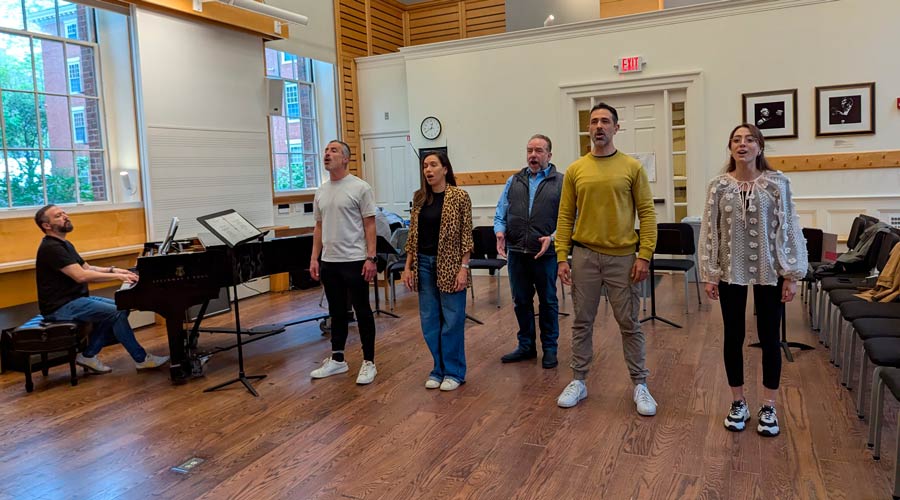Tec Querétaro professor Alfonso Molina has put on Monarca, amusical he co-wrote and composed, at Harvard’s Paine Hall.
The play tells the story of Luis, a man struggling with the problem of being an undocumented immigrant, who is relentlessly pursued by Agent Castelo from the Immigration and Customs Enforcement agency (ICE).
Alfonso wrote the script, music, and lyrics of Monarca, which has been applauded in music circles. Alfonso’s sister Mayu Molina Lehmann, a playwright herself, is the co-author of the script and lyrics.
The siblings point out that growing up on the U.S.-Mexico border enabled them to come up with a play that not only entertains but also fosters empathy and provokes reflection on a topic currently of great relevance.
“Monarca, which addresses the topic of migration, is the first Mexican-American play to be put on at Harvard’s Paine Hall. So, it’s very, very important,” emphasizes Molina.

A unique moment in time
This play employs metaphor to compare the journeys of migrants and monarch butterflies, in which the first generation travels, like the butterfly, and dies in Texas. The second generation continues on its way and the third returns, as do the migrants.
Its cast comprises Carmen Gozz, Marco Salazar, Jose Juan Hernández, Ana Regina Cuarón, Horacio Castelo, and Diego Cortes, to name but a few.
The professor explained that they have first-hand experience of President Donald Trump’s policies and how he has intensified his immigration policies by coercing educational institutions like Harvard into turning down applications from foreign students.
Significantly, due to the ongoing dispute between the university and the current U.S. government, the Harvard University Mexican Association of Students (HUMAS) extended the invitation to Professor Molina in December.
“I think we gave our performance at a unique moment in time, which is why it was so important to us,” he said.
At the end of the show there were numerous testimonials and expressions of gratitude from Harvard students who saw themselves represented in the story.
“When the curtain came down, a Mexican Harvard student said, ‘Thank you for representing me. You told my story exactly as it was. I was right there in every scene suffering with you,’” he remarked.
“Monarca is the first Mexican play addressing the topic of migration to be put on at Harvard. It’s a very important achievement.”
“The student told us that her father had been deported during the first Trump administration and that he had later passed away in Mexico.”
“She said, ‘That’s when I happened to learn about the monarch butterfly and how the first generation dies. At first this upset me, but then I understood the idea of continuation and that I was the next generation.’”
Harvard’s Paine Hall, whichhas been graced by prominent composers and lecturers, is renowned for its history and academic importance.
“It’s an incredibly beautiful place. In fact, some of my teachers studied here. It’s really good to be able to tell them about these developments and achievements,” said Molina.
“When we bring the play to Mexico, we want to make it clear that the characters are your relatives. We all have a cousin who went there and stayed: someone who is a struggling dreamer or working as a waiter,” he added.

Ten years struggling with the same problem
Alfonso told the Monarca story ten years ago to people who said it could never happen: a father could not be separated from his daughter, and you could not be taken from your home, or even your church, and be deported for no apparent reason.
“And aren’t we seeing deportations now?” he asked.
Monarca, which took more than ten years to finish, is the result of Professor Alfonso Molina and his sister Mayu’s hard work. It all started before In The Heights or Hamilton even existed.
“What makes it more painful, honestly, is that it’s an issue we’ve been working on for a very, very long time. The racism, xenophobia, and intolerance we have perceived for so long is still there and getting worse,” he commented.
This topic came up when the co-authors decided to create something that would represent their own reality to connect with other people. And who could have known that this would be exactly what a Harvard student would tell them 10 years later?
“Yes, we are portraying something that is happening, but we wish it wasn’t. And this is worse than ever,” he concluded.
What’s next for Monarca
After a short stint in Los Angeles at the Los Angeles Theatre Center (LATC) and another 20 performances in Washington, the musical was performed for the 30th time at Harvard.
Molina remarked that there are a few proposals on the table about going to universities and having students take on these roles, which is exactly what they want.
He also mentioned that they are in discussions to perform in Texas, Chicago, Los Angeles, and even England.
“We’re working on a 3-week season in New York next year. There are already several people interested, but we need more. We’re in the process of looking for investors,” Alonso added.
Initially, the idea was for Monarca to connect with fellow Mexicans in the United States and then determine what the next step would be.
“Of course I would like to bring it to Mexico City, but we should make a great production of it and not do a scaled-down version. We would like to be considered good enough to be invited onto the big stages,” he said.
This is not the first time that Professor Alfonso Molina has written about migration issues as he has written several operas on the topic that have been performed in Sonora and at the Doqumenta Festival in Querétaro.

KEEP ON READING





